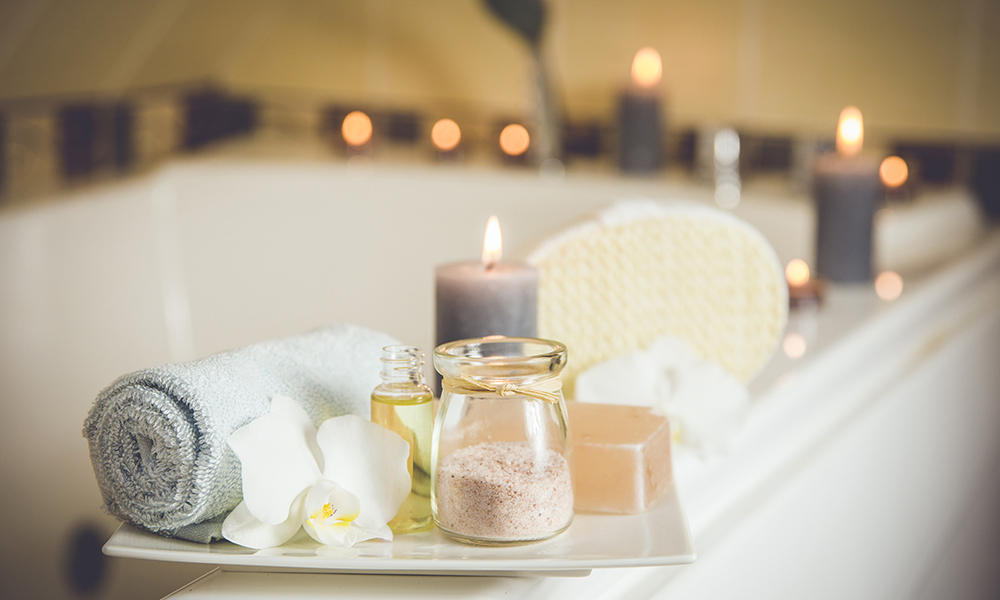Hot baths help with a long list of medical complaints. No matter whether you’re living with headaches or dry skin, a soak in the tub can be a simple and effective at-home therapy. You can also try a hot bath for muscle recovery.
Although studies debate whether you’re better off taking a hot or cold bath for sore muscles, most people find the idea of hopping into a tub filled with cold water unpleasant. That’s why we focus on hot baths! Read on to find out why a hot bath for sore muscles could be the best way to relieve your pain and improve your mood.
What Causes Sore Muscles?
Everyone experiences sore muscles at some point in their lives. If you lead an active life, sore muscles may be a result of injuries. When you damage a nerve, disk, or vertebra, the surrounding muscles will often contract around the affected part of your body to prevent any further damage. While this is a critical biological response, the resulting muscle spasms can cause you more stress and discomfort.
Medical conditions may also be at the root of your muscle pain. Poor circulation, Parkinson’s disease, and autoimmune diseases such as fibromyalgia and rheumatoid arthritis can cause muscle soreness. If you’re using ACE inhibitors to lower your blood pressure or statins to lower your cholesterol, you may also suffer from muscle aches.
Whatever the cause of your soreness, the pain can put your body in a state of increased stress, which can cause you to feel even more stiff and achy.
Why You Should Try a Hot Bath for Muscle Recovery
Here are four reasons to try a hot bath for sore muscles.
1. Relieve Muscle Stress Throughout the Body
Doctors and physical therapists often recommend heat therapy for muscle pain. You may have used a heat pack to reduce muscle soreness in a targeted area. Heat packs warm the skin and help you relax, but they can’t penetrate your muscles very effectively. Taking a hot bath for muscle recovery combines complete heat therapy with hydrotherapy, which can increase relaxation thanks to the buoyancy of the water.
A hot bath allows for a full-body release as all your muscles are thoroughly warmed and relaxed. The warm water loosens spasms and releases tension from surrounding muscles that may have been compensating for your injury. If your tub features water jets, you can even massage multiple areas of your body to soothe any stubborn aches.
2. Improve Blood Circulation for More Supple Muscles
A warm bath encourages the circulation of blood around your body. The increased blood flow provides your muscles with more oxygen and nutrients. This improves the elasticity of the connective tissues, releases muscles tightness, and relieves pain. Not surprisingly, bathing is an excellent way to combat muscle soreness from poor circulation.
Provided your aches are not a result of an injury, you can also try some light stretches in a hot bath for muscle recovery. Because your muscles are more supple and relaxed, you can safely train your flexibility and soothe your muscles. What’s more, the buoyancy of the bath can make some movements easier.

3. Easily Customize Your Bath for Different Needs
Unlike many pain-relief treatments, a bath is a versatile therapy session. As well as taking a hot bath for sore muscles, you can design your bath time around your specific needs and mood.
For example, if your muscle soreness is caused by injury or rheumatoid arthritis, you can add sea salt, lavender oil, or chamomile oil to the water. These natural products can reduce inflammation to ease your muscle pain. On the other hand, if your muscle soreness comes from stress and tension, you can try adding rose oil to your hot bath for muscle recovery. Having a wide range of bathing options makes your experience more varied and enjoyable.
4. Experience Muscle Recovery in Just 15 Minutes
A hot bath can be a long and luxurious activity, but that doesn’t mean you can’t get results from a shorter soak each day. In fact, a hot bath for muscle recovery needn’t last more than 15 to 20 minutes. After that, the bath water will start to cool and become less effective for muscle relaxation.
You may be tempted to run a hotter bath so you can enjoy the warm water for longer, but do not exceed 105 degrees. A bath that is too hot can prevent relaxation and dehydrate you very quickly, which can make muscle soreness worse. Make sure you feel comfortable in the water and keep a glass of water by the tub.
Soothe Your Muscles With a Safe Bathing Experience
Regularly taking hot baths for sore muscles can help soothe your aches and pains. With 44 strategically located air and water jets, our walk-in tubs ensure a safe, relaxing, and accessible hydrotherapy experience you can enjoy every day. To find out if a walk-in tub is right for you, take this quiz.


